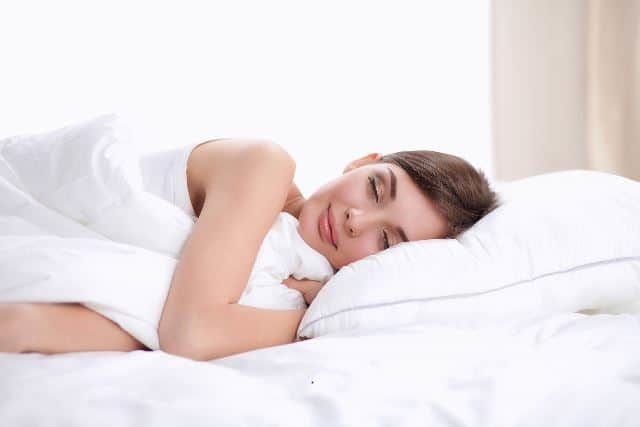How Much Sleep Do You Need? (Pt.1)
When you’re struggling to drop off, or if you’re battling the demands of work and home life, you can find yourself wondering how much sleep you can get away with. Is it ok to have just four or five hours or must you get a solid eight or nine hours every night?
If you’re suffering from insomnia, or just the demands of a newborn baby, you may be wondering – how much sleep do you need?
No matter what your circumstances, we’ve answered that question and given you all the information and facts you need to make sure you get the right amount of sleep every night.
How Much Sleep Do You Need on Average?
This is a difficult question to answer as the amount of sleep a person needs depends on a lot of different factors like age, health and lifestyle.
Many people think staying up through the night to get work finished or to meet a deadline means they are being more productive but the science shows the opposite is true.
Without enough sleep, you are sluggish and impaired which means you work slower and make more mistakes. So, next time you’re struggling on a project, take yourself to bed and get some sleep. You’ll wake up refreshed and more creative – producing better work in the long run!
There is also a difference between the amount of sleep you actually need and the amount that is recommended for you to work at your best. While you can survive on fewer hours sleep, that is only a short-term solution and you should aim to get the optimum amount.
You might be able to carry on with only six or seven hours sleep for a few days but over time this will take its toll and you should be spending more time resting.
Some inherited factors like your genes can also affect how many hours of sleep you need to function at your best.
Why is Sleep So Important?

The simple fact is the quality and length of your sleep can affect your day to day life. Have you ever felt yourself feeling “fuzzy”? Or struggling to remember things and carry out technical tasks? Instead of searching for an elusive cure, try setting yourself a challenge to get more sleep and see if that works.
A lack of sleep can affect your mental and physical health. It can stop your immune system working properly, put pressure on your heart and even affect your emotions.
Sleep isn’t just a time to rest your muscles, it gives your brain time to work. Rather than “switching off” your brain uses this rest time to carry out vital functions and oversees the maintenance of your body. Think of it like a car, you’d give it a service every now and then to make sure it is running at top condition so that is the same with your brain and your body.
Without enough hours of sleep, your brain won’t be able to maintain your body properly and things will start to change. You might find your motor skills become impaired and you aren’t feeling as creative as usual.
Prolonged periods of no or little sleep can lead to serious mental health problems and you could find yourself breaking down mentally as well as physically.
Not getting enough sleep can cause health issues and heightens the risk of obesity, diabetes and high blood pressure.
How Much Sleep Do You Need by Age?
Sleep time does vary from person to person but it also varies by age. If you have a newborn baby you will know this amount can fluctuate wildly. While you may have a friend whose child sleeps for 17 hours a day you could be struggling with a child that takes several catnaps and only sleeps for about 12 hours.
Healthy adults need between seven to nine hours to be at their best as described above but how much sleep do we need as we grow and get older?
A newborn baby should be getting at least 14 and up to 17 hours of sleep per day. This is often broken up into smaller chunks due to the needs for feeding and changing.
As a baby gets older, at four months old they will start sleeping for slightly shorter times. Between four and 11 months, your child should be sleeping between 12 and 15 hours a day.
The tricky thing with children is that sometimes they might start sleeping for 14 hours as a newborn and actually need more sleep as they grow. It is not an exact science!
A child between the ages of one and two years old should be getting about 11 to 14 hours sleep. This is a good time to introduce an afternoon nap and then try to get your baby to sleep through for eight to ten hours overnight.
At three to five years old, your baby needs ten to 13 hours sleep. Again, they might be still happy to sleep overnight and then take a nap in the afternoon. As they start school, the amount of sleep they need could increase as they are challenged physically and mentally.
At six to 13 years old, your child should be getting just a little longer than the average adult at nine to 11 hours.
A teenager should be aiming for eight to ten hours. You might find teenagers sleep a little longer than this!
All adults should be getting their seven hours or more per night but as you get into retirement age you might find it harder to sleep for longer.
A person aged over 65 only really needs seven or eight hours sleep but sometimes a nap in the day can help make up some missed hours if it is difficult to sleep overnight.
How Much Sleep Do Humans Need?

You might see your dog snoozing away all afternoon or think your pet cat seems to spend most of their time napping and wonder what the exact amount of sleep a human needs is.
While I’m sure many of us would happily stay in bed if we didn’t have the pressures of work or childcare, the average adult only gets about seven hours a night.
This might seem a lot but over time you will be missing out on vital relaxation and repair time. On average, a human needs between seven and nine hours of sleep a night.
Through evolution, humans have evolved to need less sleep than any other primate. The trick with humans is although we sleep for a shorter time than our ape cousins, our sleep is deeper.
The move from sleeping up in the tree canopy to sleeping on the ground has also aided this deeper, more restful sleep. I mean, it makes sense considering we wouldn’t have to stay alert to falling from trees.
Humans spend the most time in a deep sleep which means they sleep deeper than any other primate. This is what makes us able to survive on shorter periods of sleep compared to other primates.
How Much Deep Sleep Do You Need a Night?
There are different stages of sleep which are all needed to help you rest fully and feel prepared for the day ahead. But deep sleep is the most important as it is this time when the body repairs itself and builds up energy.
Deep sleep is defined as the period of sleep where your heartbeat and breathing is at its slowest. Your body completely relaxes and your hardly move at all. This is the point of your sleep where you don’t dream at all, your brain is busy repairing and maintaining parts of your body!
It is also known as delta sleep or slow wave sleep. It is the last stage in your sleep cycle and the most important. If you find yourself waking up sluggish even though you’ve been in bed for seven or eight hours you may not have had enough deep sleep.
A newborn baby can affect the quality of your sleep as becoming a new parent can make you hypervigilant! This can lead your body to only allowing light sleep in case you need to be on hand for your child.
Why Do We Sleep Longer in Winter?

Have you ever found yourself struggling to get out of bed on a cold, dark winter’s morning? Most people identify with the feeling of “just five more minutes” as you pull the duvet over your head.
It isn’t just the cold that keeps us under the blankets though, your brain is actually preparing for sleep earlier.
As the amount of sunlight we see during the day decreases, your brain starts to produce more of the hormone melatonin. This is the hormone that regulates your body’s sleep cycle.
This means as the sun sets earlier, your body starts to prepare you for sleep earlier. You might find yourself yawning or feeling sleepy a good few hours before your usual “bedtime”.
At the opposite end of the day, it can be hard for your body to wake up when it is still dark outside as your brain is convinced it is nighttime and you should be asleep!
Lack of sunlight through the winter can also cause SAD (Seasonal Affective Disorder)
It’s not just the lack of natural light; the cold does have something to do with your sleepiness.
Heating can change the way you sleep. When you’re cold, the production levels of melatonin in our bodies slows down, which can then cause us to feel exhausted and become more susceptible to colds and flus.
Another thing that affects our sleep patterns in winter is our eating habits. It is easy to reach for stodgy, carbohydrate rich foods to fill us with warmth.
But eating too much sugary, fatty or calorific foods can disrupt your body’s supply of leptin which is another hormone that regulates sleep.
How Much Sleep Do I Need to Lose Weight?
Not getting enough sleep increases the level of cortisol in your bloodstream. This hormone increases your appetite making you feel hungry all the time.
The less sleep you have, the higher the concentration of this hormone and the more you feel like you could eat and eat!
You might have been on diets, taken up exercise and still find it hard to lose weight. It can be particularly highlighted if you and a friend are following the same diet and fitness regime but seeing different results.
While different people’s genetics and metabolism affect the way they lose weight, it might be worth checking your sleep patterns.
Not having enough sleep makes it harder for you to lose weight so after you hit the gym you should follow these steps to make sure you are giving yourself the best chance at weight loss.
Some steps:
- Going to bed earlier stops late night snacking
- Your body burns calories while you are sleeping
- Buy healthier food so if you’re tempted to snack it will only be on low calorie foods
- Sleep deprived people don’t control their portions well
- Focusing your brain through sleep makes sure you are staying on target while you’re awake.
by: Candace Osmond from The Sleep Judge



